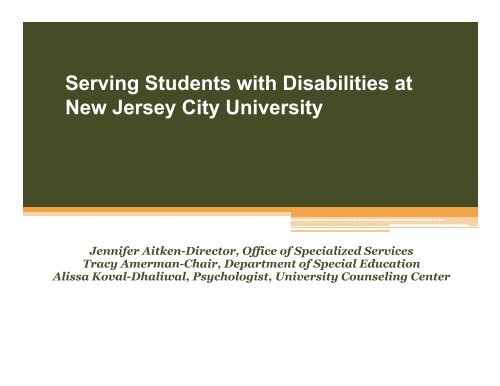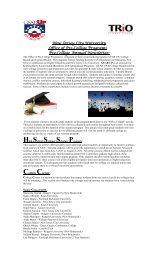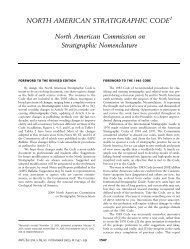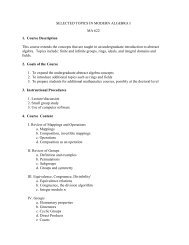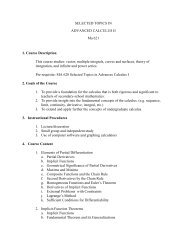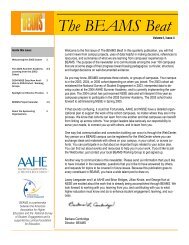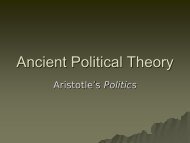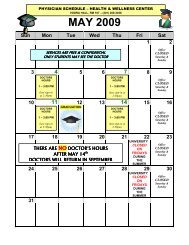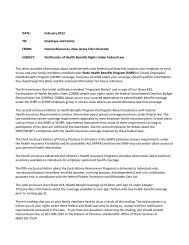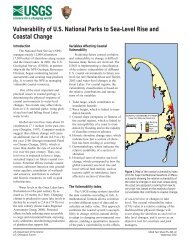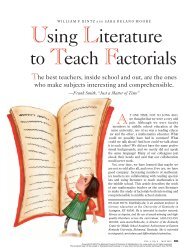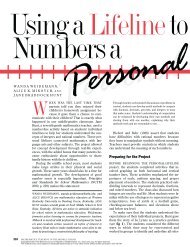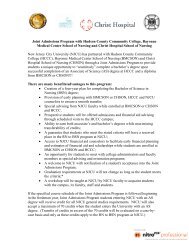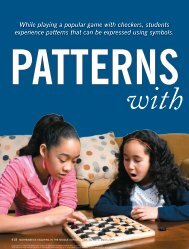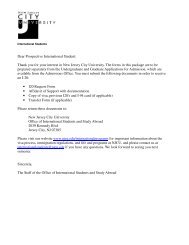Serving Students With Disabilities at NJCU - New Jersey City ...
Serving Students With Disabilities at NJCU - New Jersey City ...
Serving Students With Disabilities at NJCU - New Jersey City ...
You also want an ePaper? Increase the reach of your titles
YUMPU automatically turns print PDFs into web optimized ePapers that Google loves.
<strong>Serving</strong> <strong>Students</strong> with <strong>Disabilities</strong> <strong>at</strong><br />
<strong>New</strong> <strong>Jersey</strong> <strong>City</strong> University<br />
The Office of Specialized Services<br />
Jennifer Aitken-Director, Office of Specialized Services<br />
Tracy Amerman-Chair, Department of Special Educ<strong>at</strong>ion<br />
Alissa Koval-Dhaliwal, Psychologist, University Counseling Center
Definition of Disability in the Americans with<br />
<strong>Disabilities</strong> Act (ADA)<br />
• Mental or Physical Condition<br />
• Substantial Limit<strong>at</strong>ion<br />
▫ Significantly restricted as to the condition, manner, or<br />
dur<strong>at</strong>ion compared to the condition, manner, or dur<strong>at</strong>ion<br />
under which the average person in the general popul<strong>at</strong>ion<br />
can perform th<strong>at</strong> same major life activity.<br />
• Major Life Activity<br />
▫ Major life activities include but are not limited to: caring for<br />
oneself, performing manual tasks, seeing, hearing, e<strong>at</strong>ing,<br />
sleeping, walking, standing, lifting, bending, speaking,<br />
bre<strong>at</strong>hing, learning, reading, concentr<strong>at</strong>ing, thinking,<br />
communic<strong>at</strong>ing and working.
Section 504 of<br />
The Rehabilit<strong>at</strong>ion Act of 1973<br />
• Section 504 of the Rehabilit<strong>at</strong>ion Act of 1973<br />
protects the rights of individuals with disabilities in<br />
programs and activities th<strong>at</strong> receive federal funds.<br />
Section 504 provides th<strong>at</strong>: “No otherwise qualified<br />
individual with a disability in the United St<strong>at</strong>es . . .<br />
shall, solely by reason of her or his disability, be<br />
excluded from the particip<strong>at</strong>ion in, be denied the<br />
benefits of, or be subjected to discrimin<strong>at</strong>ion under<br />
any program or activity receiving Federal financial<br />
assistance . . .” 1<br />
1<br />
Section 504 of the Rehabilit<strong>at</strong>ion Act of 1973, as amended, 29 U.S.C. 794
Higher Educ<strong>at</strong>ion and <strong>Disabilities</strong> in NJ<br />
• No otherwise qualified individual with a disability shall, solely by<br />
reason of such disability, be excluded from particip<strong>at</strong>ion in or be<br />
denied the benefits of the services, programs, or activities of a<br />
public entity, or be subjected to discrimin<strong>at</strong>ion by any such entity.<br />
• Otherwise Qualified-A person must be able to meet the technical<br />
and academic qualific<strong>at</strong>ions for entry into the school, program, or<br />
activity in order to be considered otherwise qualified.
Oblig<strong>at</strong>ions in Higher Educ<strong>at</strong>ion<br />
Institutional<br />
• Provide reasonable<br />
accommod<strong>at</strong>ions for the<br />
student’s known disabilities<br />
• Demonstr<strong>at</strong>e a good faith<br />
effort to provide the student<br />
with meaningful access<br />
Student<br />
• Self identify th<strong>at</strong> she/he has a<br />
disability<br />
• Provide appropri<strong>at</strong>e<br />
document<strong>at</strong>ion of disability<br />
• Request accommod<strong>at</strong>ions
Document<strong>at</strong>ion Required by the University<br />
▫ Medical Records<br />
▫ Psychi<strong>at</strong>ric Evalu<strong>at</strong>ion<br />
▫ Results of Diagnostic Assessment<br />
Individualized Educ<strong>at</strong>ion Plan (IEP)<br />
Psychological Evalu<strong>at</strong>ion (WAIS)<br />
Educ<strong>at</strong>ional/Learning Assessment
<strong>Serving</strong> <strong>Students</strong> & Faculty<br />
Accommod<strong>at</strong>ions: Testing<br />
• Distraction limited<br />
environment<br />
• Spell-check or hand-held<br />
speller<br />
• Word processing for essay<br />
exams<br />
• Extended time (in face to<br />
face and online courses)<br />
• Calcul<strong>at</strong>or<br />
• Text-to-speech software<br />
for reading support<br />
Reasonable Accommod<strong>at</strong>ions
<strong>Serving</strong> <strong>Students</strong> & Faculty<br />
Accommod<strong>at</strong>ions: In the Classroom<br />
• Sign language interpreter<br />
• Assistive listening systems<br />
• Providing hand-outs in electronic form<strong>at</strong><br />
• Note-taking support:<br />
▫ Student note-takers<br />
AlphaSmart/NEO/dana<br />
▫ Tape-recording lectures<br />
Pulse Pen
<strong>Serving</strong> <strong>Students</strong> and Faculty<br />
Accommod<strong>at</strong>ions: Assignments<br />
• Installing special software in<br />
computer labs and/or libraries:<br />
▫<br />
▫<br />
▫<br />
▫<br />
Screen magnific<strong>at</strong>ion for a student<br />
with visual impairments<br />
Talking word-processing for<br />
students with learning disabilities<br />
Scan/read systems for students with<br />
learning disabilities or visual<br />
impairments<br />
Making course web sites (or online<br />
course systems) accessible
<strong>Serving</strong> <strong>Students</strong> and Faculty<br />
Assistive Technology<br />
• Ways we work with students and faculty<br />
▫ Teaching students to use technology as<br />
a reasonable accommod<strong>at</strong>ion<br />
▫ Partnership with Adaptive Technology<br />
Center for NJ Colleges <strong>at</strong> TCNJ<br />
The College of <strong>New</strong> <strong>Jersey</strong>:<br />
Adaptive Technology Center<br />
For <strong>New</strong> <strong>Jersey</strong> Colleges
Breakdown of <strong>Disabilities</strong><br />
Physical Disability/Mobility Impairment<br />
Visual Impairment<br />
Hearing Impairment<br />
Psychological/Psychi<strong>at</strong>ric/Spectrum Disorders<br />
Learning <strong>Disabilities</strong>
Wh<strong>at</strong> is a Learning Disability?<br />
• A learning disability is a neurological disorder.<br />
• <strong>Students</strong> with LD have average to above average intelligence and<br />
demonstr<strong>at</strong>e a discrepancy between potential and achievement.
Common Learning <strong>Disabilities</strong><br />
• Dyslexia – a language-based disability in which a person has trouble<br />
understanding written words. It may also be referred to as reading<br />
disability or reading disorder.<br />
• Dyscalculia – a m<strong>at</strong>hem<strong>at</strong>ical disability in which a person has a difficult<br />
time solving arithmetic problems and grasping m<strong>at</strong>h concepts.<br />
• Dysgraphia – a writing disability in which a person finds it hard to form<br />
letters or write within a defined space.<br />
• Auditory and Visual Processing Disorders – sensory disabilities in<br />
which a person has difficulty understanding language despite normal<br />
hearing and vision.<br />
• Nonverbal Learning <strong>Disabilities</strong> – a neurological disorder which<br />
origin<strong>at</strong>es in the right hemisphere of the brain, causing problems with<br />
visual-sp<strong>at</strong>ial, intuitive, organiz<strong>at</strong>ional, evalu<strong>at</strong>ive and holistic<br />
processing functions.
Challenges These <strong>Students</strong> May Face<br />
Recall<br />
Reading Comprehension<br />
Reading Fluency<br />
Organiz<strong>at</strong>ion<br />
Time Management<br />
Anxiety<br />
Spelling<br />
Social Challenges
Psychological/Emotional/Spectrum Disorders<br />
Bipolar Disorder<br />
ADD/ADHD<br />
Depression<br />
Anxiety Disorder<br />
Schizophrenia<br />
Asperger Syndrome<br />
Autism
Challenges These <strong>Students</strong> May Face<br />
Extreme Anxiety<br />
Confusion<br />
Extreme Emotional Responses<br />
Off Topic Behavior<br />
Off Task Behavior<br />
Egocentricity<br />
Social Challenges
HOW CAN THE COUNSELING CENTER HELP<br />
YOU?<br />
• We can discuss with you:<br />
▫ Concerns about student behavior<br />
▫ Str<strong>at</strong>egies for classroom management<br />
▫ Questions about mental health diagnoses<br />
▫ You may also visit our website <strong>at</strong>:<br />
http://web.njcu.edu/dept/counselingcenter for additional<br />
inform<strong>at</strong>ion and resources.<br />
▫ We cannot discuss whether a particular student is or has been a<br />
client of the Counseling Center unless th<strong>at</strong> student has provided<br />
us with written permission to release the inform<strong>at</strong>ion to you.
HOW CAN THE OSS HELP YOU?<br />
• We can discuss with you:<br />
▫ Appropri<strong>at</strong>e accommod<strong>at</strong>ions<br />
▫ Policies and procedures<br />
▫ Individual cases<br />
▫ Disability-specific questions<br />
▫ Legal responsibilities of colleges/universities<br />
▫ Document<strong>at</strong>ion requirements<br />
▫ Teaching str<strong>at</strong>egies to assist all learners<br />
• You may also visit our website <strong>at</strong>:<br />
http://web.njcu.edu/programs/oss for additional inform<strong>at</strong>ion<br />
and resources.<br />
• We cannot discuss a particular student’s disability or st<strong>at</strong>us in<br />
OSS unless the student self-disclosed to you.
HOW CAN YOU HELP?<br />
• Syllabus St<strong>at</strong>ement (e.g., If there is any student in this class<br />
who has special needs because of learning disabilities or other<br />
disabilities please contact the Office of Specialized Services @ 201-<br />
200-2557)<br />
• Make Appropri<strong>at</strong>e Referrals<br />
• Be Firm<br />
• Be Consistent<br />
• Establish clear guidelines<br />
• Try to avoid last minute changes<br />
• When possible use multisensory approach
Remember<br />
• Be sensitive, provide reasonable supports, but<br />
always maintain academic and behavioral<br />
standards.


